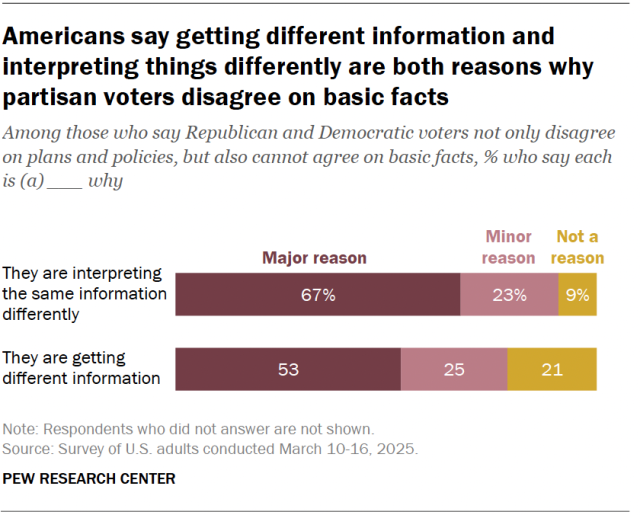☀️ Happy Thursday! The Briefing is your guide to the world of news and information. Sign up here!
In today’s email:
- Featured story: TikTok rolls out crowdsourced fact-checking system
- New from Pew Research Center: Most Americans say Republican and Democratic voters cannot agree on basic facts
- In other news: FCC approves Paramount-Skydance merger
- Looking ahead: Amazon will pay NYT $20-25 million annually to use its content for AI
- Chart of the week: Why do partisan voters disagree on basic facts?
🔥 Featured story
TikTok announced this week that it will begin rolling out Footnotes, a crowdsourced fact-checking system similar to Community Notes on X and Meta. The system will allow users to contribute additional context to videos on the platform, including those they see as containing false or misleading information.
The introduction of this fact-checking tool comes at a time when TikTok users are increasingly getting news on the site. The share of U.S. adult TikTok users who regularly get news on the platform has more than doubled in recent years – from 22% in 2020 to 52% in 2024. That means 17% of all U.S. adults regularly get news there.
And they’re not just getting news from journalists: Just as many TikTok news consumers say they get news on the site from influencers or celebrities (68%) as from news outlets or journalists (67%), according to a March 2024 survey from the Pew-Knight Initiative.
🚨 New from Pew Research Center
Eight-in-ten U.S. adults say that when it comes to important issues facing the country, Republican and Democratic voters not only disagree on plans and policies, but they also cannot agree on basic facts, according to a new Center analysis. About a fifth of Americans (18%) say voters in both parties can agree on basic facts, even if they disagree about policies.
One thing Republicans and Democrats can largely agree on, however, is their disagreement: 83% of Democrats and 79% of Republicans say voters from the two parties disagree on basic facts.
Read more about whether Americans think partisan voters can agree on basic facts.
📌 In other news
- FCC greenlights $8 billion merger between Paramount and Skydance, launches investigation into Comcast’s relationship with NBC local affiliates
- Australia expands teen social media ban to cover YouTube, which will start estimating ages of U.S. users
- Local publishers are bundling New York Times content with their subscriptions
- Project Veritas drops libel lawsuit against The New York Times
- News outlets sue Tennessee over new law they say restricts journalists’ ability to report on public safety
- Meta says it will no longer accept political ads in the EU in response to new regulations
- The Dallas Morning News rejects acquisition bid from Alden Global Capital
📅 Looking ahead
Amazon has agreed to pay The New York Times at least $20 million per year to use Times journalism in its AI products and other services. The deal includes access to news articles as well as content from NYT Cooking and The Athletic.
About one-in-five U.S. adults (19%) say they regularly get news from The New York Times, according to a March 2025 survey. A somewhat larger share (32%) say they trust The Times as a source of news, while 22% say they distrust it.
This comes at a time when Americans largely foresee AI having a negative effect on the news. Roughly half of U.S. adults say AI will have a very (24%) or somewhat (26%) negative impact on the news people get in the U.S. over the next 20 years, while just 10% say it will have a positive effect, according to a 2024 Center survey.
📊 Chart of the week
Among those who say Republican and Democratic voters cannot agree about basic facts, 67% say a major reason is that partisan voters are interpreting the same information differently. And 53% say a major reason is that partisan voters are getting different information entirely.
Overall, 40% of those who received this question say both are major factors, according to our new analysis.
CORRECTION: Last week’s Briefing referred to Alden Global Capital as a hedge fund. It is an investment firm.
👋 That’s all for this week.
The Briefing is compiled by Pew Research Center staff, including Naomi Forman-Katz, Jacob Liedke, Christopher St. Aubin, Luxuan Wang, Emily Tomasik, Joanne Haner, and Mary Randolph. It is edited by Michael Lipka and copy edited by Anna Jackson.
Do you like this newsletter? Email us at journalism@pewresearch.org or fill out this two-question survey to tell us what you think.
